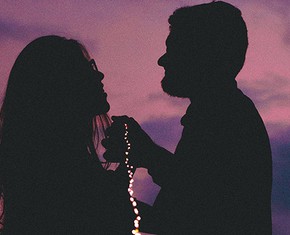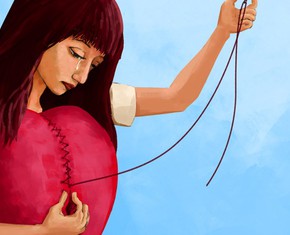The views expressed in our content reflect individual perspectives and do not represent the authoritative views of the Baha'i Faith.
We’ve both known hunger. We don’t just mean the “skipped-lunch-now-I’m-starving” kind of hunger. We mean destructive, imprisoning, dehumanizing hunger.
We both have had eating disorders, so we’ve experienced the kind of hunger that makes you nauseous and weak, strains your heart, and breaks your mind. Because of these diseases, we understand the kind of hunger that devours millions and ravages children, teens, adults, and families, the kind of hunger that kills.
RELATED: How Religion Helps Us Cope With Mental Health Challenges
Andréana: I was blessed to grow up in a home with loving and supportive parents who provided me with a good education and opportunities to travel, serve and grow. But their love, provisions, and support did not prevent me from developing a deadly eating disorder when I was 15.
Kim: I was less fortunate. I grew up in a home torn apart by domestic and family violence. Though I was provided a good education and some moments of normalcy, my brothers and I suffered severe emotional and physical abuse. I also developed an eating disorder at age 15.
Andréana: My eating disorder began when my family lived in Israel. The volatile political situation there resulted in people dying in suicide attacks and military reprisals almost daily. In that environment, I became fearful about the state of the world, miserable in school, and unable to sleep. The constant traumatic stress led to me almost losing my life to anorexia nervosa.
Kim: I craved the acceptance I didn’t receive at home. The popular girls at school, in the media, and on TV were pretty and thin. They talked about diets, exercise, and who they were dating. I decided to go on a diet. Little did I know this was a dangerous entry point into a long battle with bulimia nervosa.
RELATED: How Mindfulness Can Help Us Combat Anxiety
Modern medicine recognizes that eating disorders are deadly. In fact, they have the second-highest mortality rate of all mental health challenges, falling closely behind opioid addiction. Often easy to ignore or even dismiss, these diseases of mind and body cut across all race, class, gender, and identity lines. In the U.S. and globally, about 9% of the population will face an eating disorder in their lifetimes.
Numerous organizations, including the National Institute of Mental Health, continue to warn about the harmful effects of eating disorders, even as doctors and researchers struggle to identify the root causes, which include genetic, social, and spiritual factors. In the long run, eating disorders ravage sufferers’ cardiovascular, endocrine, neurological, reproductive, digestive, and skeletal systems — that is, if the sufferer doesn’t die first.
Andréana: Anorexia is not a simple loss of appetite or obsession with dieting. I compare it to a parasite. Anorexia overtakes your rational brain and sucks the life out of your body, slowly and painfully. People who suffer from this disease definitely feel hunger and exhaustion. But their pain is often ignored, dismissed, or even reinforced. I can’t tell you how many times people told me, “You look great!” and “I wish I had anorexia. You’re so lucky to be skinny.” You’d never say that to someone with cancer.
Kim: What started as a simple New Year’s Eve resolution developed into anorexia and then bulimia. As I lost weight, teachers, and friends at school complimented me. I restricted my eating even more, lost additional pounds, and received even more praise. Even though I barely ate, I was always thinking about food. I was famished. When a few friends shared that they made themselves vomit after eating to keep their weight under control, I experimented, not realizing that I was entering into the confinement of a full-fledged eating disorder that imprisoned me for more than a decade.
As we spiraled into disease states during adolescence, we both realized that starvation and controlling our bodies represented symptoms of something much deeper. We both struggled to find reasons for living in this traumatic and unjust world. Our hunger was a soul hunger. While physical and mental healing was essential, true recovery hinged on reclaiming our nobility, beauty, and aliveness — realizing, as Baha’u’llah, the prophet and founder of the Baha’i Faith wrote, that:
Ye are the stars of the heaven of understanding, the breeze that stirreth at the break of day, the soft-flowing waters upon which must depend the very life of all men.
We each took different paths to recovery and health, and the Baha’i teachings helped us immeasurably:
Kim: I became a Baha’i during my early recovery from trauma. I couldn’t see my way out of the eating disorder, but I persevered. Individual and group therapy, appointments with dietitians and doctors, and my newly-found Faith were all necessary elements of the healing process. Finally, in my early thirties, I felt free, but not without consequences. Today, in my sixties, I deal with osteoporosis, a common fate for many survivors. Bone fractures are all too common. I take special care, especially in winter, to prevent falls.
Andréana: I actually had to distance myself from others for a while, as I tried to heal and keep the flame of my deepest faith — God’s love for my life — alive. Like Kim, it took me about a decade to heal from the inside out. Recovery is hard, exhausting, lonely work. You can feel like you’re going backward, sideways, and in all directions except forward. Following a period of hospitalization, family intervention, and outpatient treatment, I did most of the work by myself. But I also had amazing friends and healers who walked some of the way with me.
RELATED: Why Do Baha’is Fast Every Year?
Part of our journey as Baha’is includes praying daily and observing the Baha’i Fast, which occurs once a year during the 19-day Baha’i month before the vernal equinox, the Baha’i New Year. During this period Baha’is, if they’re not ailing, traveling, or pregnant, abstain from food and drink between sunrise and sunset, in order to strengthen such inner qualities as compassion, clarity, and steadfastness in their relationship with God. Shoghi Effendi, the Guardian of the Baha’i Faith, explained:
Fasting is essentially a period of meditation and prayer, of spiritual recuperation, during which the believer must strive to make the necessary readjustments in his inner life, and to refresh and reinvigorate the spiritual forces latent in his soul.
Even though there are exemptions from the physical requirements of the Fast and passages that emphasize the Fast’s spiritual focus, both of us have wrestled with whether or not to abstain from food and drink between sunrise and sunset, given our previous illnesses.
Andréana: For years, the spiritual injunction to fast and deprive my body during the daytime sent my mind into a very damaging place. Fortunately, doctors and my own father have acted as a voice of reason, telling me, in no uncertain terms, that physical fasting is unhealthy for me and medically dangerous.
Even so, I often feel guilty during the Fast, especially when Baha’i friends and coworkers trade fasting stories at the end of the day, when hunger gets intense. I feel like I’m missing out on a rite of passage, a precious and holy time of year when bounties are raining down and the hollow cavity of the body is more receptive to God’s grace.
Kim: While I tried to physically fast, I also began to question: was I fasting for the love of God or re-entering a disease state? My honest answer was that I felt that old twisted addictive obsession kick-in. My doctors, including Baha’i physicians, couldn’t believe I had attempted the Fast and advised me to stop. It was clear to them: I had recovered from a life-threatening illness, and just like cancer, it could return if I wasn’t vigilant. A Baha’i physician also reminded me that Baha’u’llah commanded that in “time of ill health it is not permissible to observe these obligations.”
Over the years and through conscious inner work, both of us have come to treasure the annual time of the Baha’i Fast, which makes these 19 days sacred — a time to rise before sunrise, to pray and meditate more, to slow down from daily concerns and focus on improving spiritual connectedness. Instead of reprimanding ourselves, we focus on upholding the spirit of the law, turning to God in all humility, praying and meditating, and finding ways to be of greater service to others.
RELATED: 9 Health and Wellness Tips from a Baha’i Perspective
Both of us, we’re very happy to report, are now free from the prison of disease and despair. We’ve found ways to satisfy both our physical and spiritual hunger. We have learned how to care for ourselves, stay hydrated, nourished, and rested. We each have supportive networks, soul-enriching relationships, and are engaged in meaningful work.
So during the Baha’i Fast, we dedicate ourselves to spiritual recuperation in a variety of ways, seeing these sacred days as a time to grow closer to God, not further from Him. For those of us who have struggled with an eating disorder, whether diagnosed or not, and even if the disease is in remission, we’ve learned from medical professionals that abstaining from food and drink between sunrise and sunset is dangerous for us, and risks triggering a recurrence of these deadly disorders.
If you’re in recovery or have a history of these diseases, please seek guidance from your medical team. Don’t allow the voices of guilt, shame, or peer pressure, including those inside your own head or within your community, to pull you off the path of healing and truth. Take care of yourself. We need your strength and courage, your gifts, and your beauty. We need you to live, now more than ever.
If you or a loved one are struggling with an eating disorder, please reach out to the National Eating Disorders Association.

















Comments
Sign in or create an account
Continue with Googleor